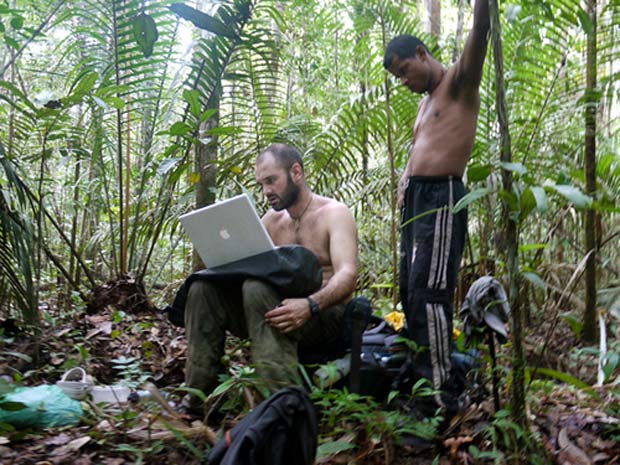He Walked 6000 Miles!
| Site: | Plateforme pédagogique de l'Université Sétif2 |
| Cours: | Oral Expression |
| Livre: | He Walked 6000 Miles! |
| Imprimé par: | Visiteur anonyme |
| Date: | jeudi 29 janvier 2026, 11:22 |
Description
This chapter deals with a text about the British adventurer ED Stufford and his personal blog ; both recount his long journey in the Amazon. In this context, students will come across the use of the past simple as well as continous.
1. What's in the news?


 What’s in the news ?
What’s in the news ?
Starter
- What is the past simple of these verbs ?
|
Leave take begin become go do think meet walk arrive explain end want decide |
- Practice saying them loudone by one.
He walked 6000 Miles !
Past Simple And Continuous
- Visit ED Stufford’s web page. What was he the first to do ?
- Read and complete the text with the verbs from the starter in the past simple.
Walking the Amazon
Amazing journey ends after 6000 miles
ED Stufford became the first man in history to walk the length of the Amazon River from the source to the sea. He…………..for 860 days. The journey………….in aparil 2008 when ED………….the town of Camana on the Pacific Coast of Peru. It in August 2010 when he in Maruda, on the Atlantic coast of Brazil. He ………….through three countries, Peru, Colombia, and Brazil. The journey…………nearly two and a half years. ‘I………………it for the adventure.’ Says ED.
- Now listen and check. Pay attention to the pronunciation of the verbs.
- Work with a partner. Write the questions. Take consideration of the form of the questions in the past tense.
- How far/ED walk ? (how far did he walk ?)
- When/ journey begin ?
- Where/ journey end ?
- Which countries /go through ?
- How ling/ journey take ?
- Why/do it ?
- Now look at the map and read the text silently. Contextualize difficult words. Answer the questions you formulated. Be careful with the tense form (simple past).
- Listen and check. Practice the questions and answers with a partner if possible ; if not, do it yourself. Pay attention to the tense form and pronunciation of words.
- Read Cho’s story. Who is Cho ?
Cho’s story
ED didn’t do the trip alone. His companion was Gadiel Cho Sanchez Rivera, a forestry worker from Peru. Cho said, ‘when I first met ED, I was working in the forest. I thought he was crazy, but I wanted to help him and his guide.’ One day we were walking in a very dangerous part of the forest when we saw a hostile tribe. They didn’t understand what ED was doing there. I explained he was an adventurer and he was walking the Amazon. They decided he was crazy, too.
- Which tense are the verbs in bold in Cho’s story ?
- Complete the sentences.
- Cho was working in the forest when he…….
- They were walking in a dangeroous part of the forest when they………
- The tribe didn’t understand that ED ………..
- Write the questions. Pay attention to the form of the tense (past continuous).
- What /Cho doing/ when/met ED ?
- Where/ walking/when/saw/ tribe ?
- Why/tribe think/ED/ crazy ?/
- Listen and check. Pay attention to pronunciation, stress patterns, intonation, and use of past continuous tense.
|
Grammar spot |
ED walked the Amazon. He began his journey in 2008.
When……..the journey begin ? They……….finish the journey till 2010.
Cho was walking in the forest when he met ED. Compare these sentences. I had a shower last night (completed action). I was having a shower when the phone rang (interrupted activity).
|
1.1. ED's Blog
- Read ED’s blog. Put the verbs in brackets in the past simple or the past continuous. Be careful with verb forms in both tenses.
ED’s Blog
12 July the day I nearly died
Today I……….. (walk) next to the river when I nearly ………..(stand) on a snake. I……….(stop) immediately. The snakes’s fangs……..(go) in and out. I was terrified. I……..(move). One bite and you’re dead in three hours.
10 September knives and guns
Early this morning we……….(cross) the river by boat when we ………(see) five canoes. The tribesmen ………..(carry) knives and guns. They were angry because we ……..not have permission to be on their land. We……..(leave) as fast as we could.
24 November the jungle at night
I……….(lie) in my hammock last night trying to sleep, but i twas impossible because the noise of the jungle was so loud. Monkies……..(scream) in the trees and millions of mosquitos………(buzz) round my head. I……..(take) a sleeping pill and finally ………(fall) asleep at 3 a.m.
- Listen and check. Pay attention to the form and use of verbs, pronunciation, stress patterns, and intonation.
- Think of more questions to ask about ED and Cho.
What did they eat ? How did they navigate ?
2. Listening to the news
 Listening and Speaking
Listening and Speaking
The news
- How do you keep up to date with what’s happening in the world ?
- Which of these news topics interests you most ?
|
Politics celebrities sport fashion culture the arts crime international news national news local news |
- Do you listen to the radio ? Which station ?
- Listen to five radio news headlines. What is the first story about ? The second ?
- Write a number from 1‒5.
- A strike an explosion a crime a football match death
- Which words do you think are from each story ?
|
Terrorists thieves guards ex‒wife Picasso cancer goals theft half time higher pay beat protesting injured close |
- Write the question words.
- .............planted the bomb ?
- ………..paintings did they steal ?
- ……….are they on strike ?
- ……….times was he married ?
- …………was the score ?
- Listen to the stories. Which questions were answered ? Focus attention on the form of questions, stress patterns and intonation.
Dictation
- You will hear the story about the art theft at dictation speed. Write the exact words.
3. Vocabulary of Adverbs
 Vocabulary
Vocabulary
Adverbs
- Many regular adverbs end in –ly. Match a verb in A with an adverb in B.
|
verbs |
Adverbs |
|
Drive Love Speak Rain Wait Fight
|
Fluently Carefully Patiently Bravely Heavily Passionately
|
- Listen and check. Be careful with the formation of adverbs. Try to remember the sentences. Focus on stress over syllables.
- What do you notice about the adjectives and adverbs in these sentences.
- Is this fast train to London ?
- Slow down you are driving too fast.
- I got up late this morning.
- We had a late breakfast.
- I work hard and play hard.
- She’s a very hard worker.
- What is the adverb from these adjectives? Complete the lines with the adverbs.
|
Clear quiet slow honest perfect complete good bad easy |
- Play a game well and win.
- Play a game …….and lose.
- Explain the rules…………
- Shut the door…………….
- Forget something………..
- Get out of bed……………
- Play the piano……………
- Pass an exam……………
- Answer the questions………….
Word order
- Correct the word order in these sentences. Pay attention to the adverb forms.
- She speaks very well English.
She speaks English very well.
- He started last week a new job.
- Please read carefully the instuctions.
- Do you work still for the same company ?
- Nver I can remember her name.
- We had last year in Spain a holiday.
- Put the adverbs in the correct palce in the sentences
- My grandma is 75 and she goes swimming.
(nearly, still, regularly)
- ‘Do you love me ? ‘ I do. I will love you.’
(really, of course, always)
- I was relaxing with a good book when someone knocked on the door.
(just, really, loudly)
- My sister is three, but she can read, and she can write.
(only, already, too)
- Break the eggs into the bowl with some milk and butter. Heat it gently. When it is ready, serve the scrambled eggs with toast.
(first, then, immediately)
- All my friends have a mobile phone. They are on Facebook. My dad is on Facebook.
(almost, as well, even)
- Listen and check. Pay attention to the forms of the adverbs, pronunciation, as well as stress.